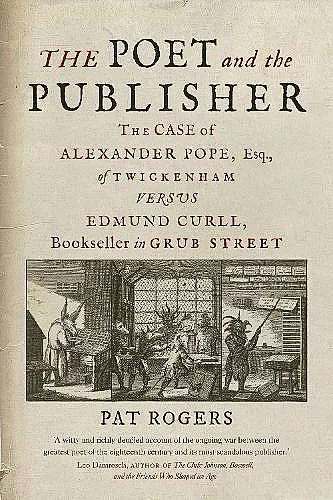The Poet and the Publisher
The Case of Alexander Pope, Esq., of Twickenham versus Edmund Curll, Bookseller in Grub Street
Format:Hardback
Publisher:Reaktion Books
Published:17th May '21
Should be back in stock very soon

The quarrel between the poet Alexander Pope and the publisher Edmund Curll has long been a notorious episode in the history of the book, when two remarkable figures with a gift for comedy and an immoderate dislike of each other clashed publicly and without restraint. However, it has never, until now, been chronicled in full. Ripe with the sights and smells of Hanoverian London, The Poet and Publisher details their vitriolic exchanges, drawing on previously unearthed pamphlets, newspaper articles and advertisements, court and government records, and personal letters. The story of their battles in and out of print includes a poisoning, the pillory, numerous instances of fraud, and a landmark case in the history of copyright. Indecently entertaining, the book is a forensic account of events both momentous and farcical.
‘Drawing on deep familiarity with the period and its personalities, Pat Rogers has given us a witty and richly detailed account of the ongoing war between the greatest poet of the eighteenth century and its most scandalous publisher. Cleverly presented as the trial of Pope v. Curll, with scores of documents as “exhibits” and with posterity as jury, the narrative fully justifies the author’s comment that “Pope and Curll are both inherently funny.”’ – Leo Damrosch, author of the bestselling The Club: Johnson, Boswell, and the Friends Who Shaped an Age
ISBN: 9781789144161
Dimensions: unknown
Weight: unknown
472 pages